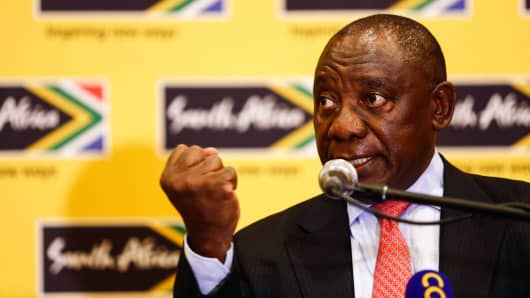Even though countries in Africa have been hit by external headwinds, the continent is well on the path to becoming more resilient with infrastructure projects and sound government policies in place, said the president and CEO of a development finance institution on Thursday.
“South Africa, Nigeria, Angola have dragged the continent behind,” Samaila Zubairu, president and CEO of Africa Finance Corporation (AFC), told CNBC at the International Monetary Fund and World Bank meetings in Bali, Indonesia.
Those three economies — the largest in Africa — have performed below expectations, according to the IMF which said the continent as a whole would stand to benefit if the three countries were performing up to their potential.
The larger economies in Africa are “heavily dependent on commodity prices” and face more serious challenges compared to smaller countries such as Rwanda, Ethiopia, Kenya, Ghana and Tanzania that have fared better in terms of growth, Zubairu added.
Another challenge Africa faces is rising U.S. interest rates which affect the level of investments in businesses, he said.
However, as African governments increase spending in infrastructure, agriculture and move away from being overly import-dependent, the outlook for growth is positive, Zubairu added.
“The continent itself has resilience now. You know with the adjustment by governments away from, I would say, import dependent growth,” Zubairu explained. “There is a lot of emphasis on driving agricultural spending. There’s a lot of investment in infrastructure, all of which would … accelerate the shared growth in the continent.”
China’s 300 million funding to AFC
“Infrastructure spending … I think is one of the things that are required to lift the continent,” Zubairu said.
AFC has reportedly acquired a $300 million loan facility from a Chinese state-funded and state-owned policy bank, the Export-Import Bank of China, for development projects in the continent.
Some experts have raised questions about whether Chinese investments in Africa come with strings attached.
Zubairu said that the $300 million investment does not mean that AFC has to buy more Chinese exports in return.
However, he added: “There are certain projects that … can be tied to Chinese export(s) and we would consider those. But the one we have for now is … not tied to a specific Chinese export(s),” he said.
Even though countries in Africa have been hit by external headwinds, the continent is well on the path to becoming more resilient with infrastructure projects and sound government policies in place, said the president and CEO of a development finance institution on Thursday.
“South Africa, Nigeria, Angola have dragged the continent behind,” Samaila Zubairu, president and CEO of Africa Finance Corporation (AFC), told CNBC at the International Monetary Fund and World Bank meetings in Bali, Indonesia.
Those three economies — the largest in Africa — have performed below expectations, according to the IMF which said the continent as a whole would stand to benefit if the three countries were performing up to their potential.
The larger economies in Africa are “heavily dependent on commodity prices” and face more serious challenges compared to smaller countries such as Rwanda, Ethiopia, Kenya, Ghana and Tanzania that have fared better in terms of growth, Zubairu added.
Another challenge Africa faces is rising U.S. interest rates which affect the level of investments in businesses, he said.
However, as African governments increase spending in infrastructure, agriculture and move away from being overly import-dependent, the outlook for growth is positive, Zubairu added.
“The continent itself has resilience now. You know with the adjustment by governments away from, I would say, import dependent growth,” Zubairu explained. “There is a lot of emphasis on driving agricultural spending. There’s a lot of investment in infrastructure, all of which would … accelerate the shared growth in the continent.”
China’s 300 million funding to AFC
“Infrastructure spending … I think is one of the things that are required to lift the continent,” Zubairu said.
AFC has reportedly acquired a $300 million loan facility from a Chinese state-funded and state-owned policy bank, the Export-Import Bank of China, for development projects in the continent.
Some experts have raised questions about whether Chinese investments in Africa come with strings attached.
Zubairu said that the $300 million investment does not mean that AFC has to buy more Chinese exports in return.
However, he added: “There are certain projects that … can be tied to Chinese export(s) and we would consider those. But the one we have for now is … not tied to a specific Chinese export(s),” he said.
[“source=businessinsider”]





